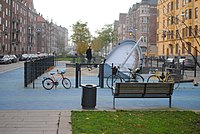Sønder Boulevard

Sønder Boulevard (lit. "South Boulevard") is a boulevard in the Vesterbro district of Copenhagen, Denmark, whose broad central reserve has been turned into a linear park with various facilities for sports and other activities. It extends from Halmtorvet and continues south-west to Enghavevej at Enghave station.
History
Sønder Boulevard follows the initial stretch of Denmarks first railway, the West Line between Copenhagen and Roskilde, which opened in 1847. In 1864, the rail line was moved to a more northern corse, through Frederiksberg, before being moved to its current position just south of Sønder Boulevard in 1911. The portion of the abandoned railway terrain closest to the city was transformed into a street known as Ny Stormgade, but Sønder Boulevard in its current form was established in 1905. The name was chosen to complement Vester Boulevard (en. West Boulevard), which was renamed H. C. Andersens Boulevard in 1954.
In World War II, a stray British bomb hit No. 106 and exploded during Operation Carthage on 21 March 1945, killing 11 people in the building.[1]
Sønder Boulevard was long a dilapidated thoroughfare dominated by traffic. The elm trees which originally lined it were hit by Dutch elm disease and had to be removed.[2]
After Halmtorvet was refurbished between 1999 and 2003, Sønder Boulevard was given similar treatment from 2005 to 2007. The project was designed by SLA.
Design and facilities

The boulevard has sections with different forms of vegetation such as lawns and perennial gardens. Facilities include a playground with a shipwreck theme, a ball cage, a track for BMX bikes and seating areas with very different ambiances.[3]
Buildings
Most of the boulevard is lined with typical Copenhagen five-storey residential buildings from the late 19th and early 20th century. Absalon's Church (No. 73) was completed in 1934 to design by Arthur Wittmaack.[4] Wittmaack has already designed the cinema Boulevard Teatret which opened at No. 79-81 in 1924. In 1965, it was taken over by Peter Refn og Knud Hauge and operated as Copenhagen's first art cinema under the name Camera. It cloased after Regn took over Grand Teatret in 1974.[5]
References
- ^ "Sønder Boulevard - Operation Carthage" (in Danish). geocaching. Retrieved 2011-09-21.
- ^ "Græsserende byfornyelse" (in Danish). Dagbladet Information. Retrieved 2011-09-21.
- ^ "Sønder Boulevard". Danish Architecture Guide. Retrieved 2011-09-20.
- ^ "Absalons Kirke" (in Danish). nordenskirker.dk. Retrieved 5 January 2015.
- ^ "En stolt tradition for kunstfilm i Danmark" (in Danish). nordenskirker.dk. Retrieved 5 January 2016.
{{cite web}}: Cite has empty unknown parameter:|1=(help)
External links
- Sønder Boulevard on SLA's website
- Sønder Boulevard with images on online architecture guide
